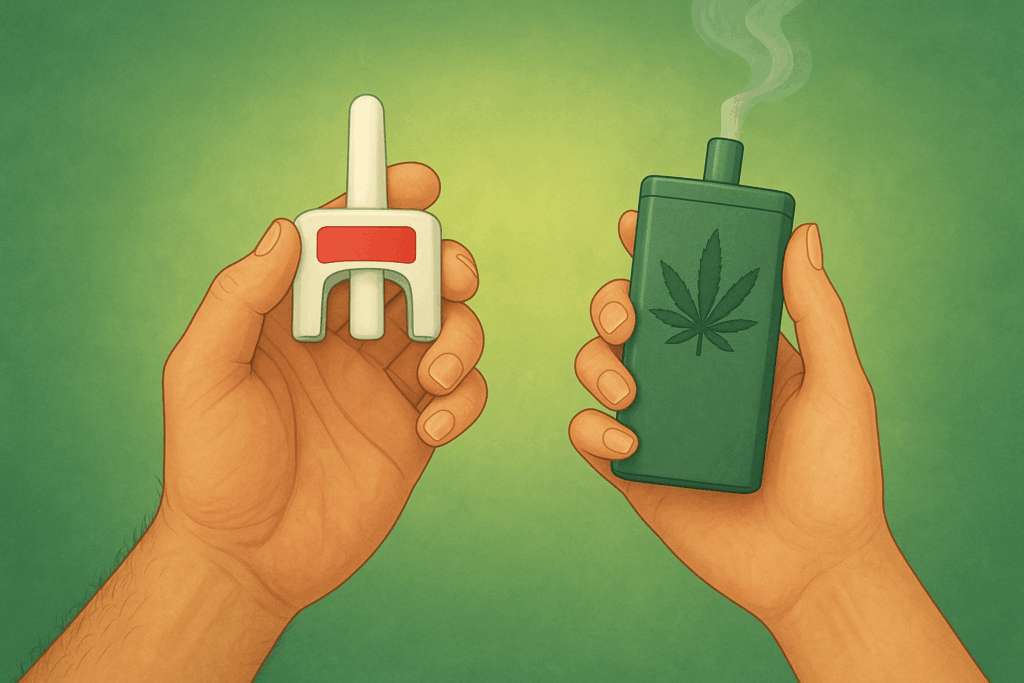When someone overdoses on opioids, Narcan, often known by the generic name of its active ingredient Naloxone, can save their life. It works by quickly blocking the effects of opioids in the brain, reversing respiratory depression or arrest, and quickly restoring breathing and consciousness. But for people dependent on opioids, Narcan can also trigger sudden withdrawal—a wave of nausea, pain, anxiety, and agitation that hits within minutes.
This uncomfortable reaction sometimes causes fear or hesitation around using naloxone, even though it’s a proven lifesaver. Scientists have long been asking: Is there a way to make overdose reversal both safer and less traumatic?
A new proof-of-concept study (J. D. Jones et al., 2025) suggests that cannabis, or more precisely, cannabinoids from the cannabis plant, might help.
What the Researchers Explored
In this case study, researchers wanted to know whether vaporized cannabis could soften the symptoms of withdrawal triggered by Narcan. The idea comes from years of preclinical and clinical evidence showing that cannabinoids can calm the nervous system and may reduce the discomfort of opioid withdrawal.
The team tested this in a tightly controlled inpatient setting. The participant, a 52-year-old man with opioid use disorder, was stabilized on oral morphine for several weeks before testing began. Researchers then introduced different combinations of:
- Vaporized cannabis (12.5 mg or 25 mg doses)
- Intranasal Narcan (4 mg, the standard emergency dose)

They measured the participants’ withdrawal symptoms using the Clinical Opiate Withdrawal Scale (COWS), a standard clinical tool where higher numbers reflect more severe symptoms.
What They Found
When Narcan was given alone, the participant’s withdrawal symptoms reached a COWS score of 22, moderate to severe withdrawal.
But when the participant inhaled cannabis 15 minutes before naloxone, the scores dropped noticeably:
- 17 with a 12.5 mg cannabis dose
- 14 with a 25 mg cannabis dose
That’s a meaningful difference. While cannabis didn’t completely prevent withdrawal, it clearly reduced its intensity.
Importantly, combining the two didn’t create new safety concerns—heart rate and blood pressure rose slightly (as expected during withdrawal), but no more than with Narcan alone.
Why This Matters
This early finding adds to a growing body of research suggesting that cannabinoids may help bridge gaps in opioid treatment and harm reduction. If future studies confirm these effects, it could change how we respond to overdoses: by pairing Narcan with cannabinoids to reverse the overdose while easing the crash that follows.
For people in recovery, or those at risk of overdose, this could mean fewer barriers to using Narcan when it’s needed most. A more compassionate response. A better chance to survive, stabilize, and heal.
The Takeaway
This is just the beginning. One participant is inconclusive, but the signal is strong enough to warrant further research.
The takeaway? Science is moving toward a more integrative and humane approach to addiction care—one that recognizes that saving a life is more than restarting a heartbeat; it’s also about easing the suffering that comes after.
References:
Jones JD, Martinez S, Arout C, Haney M, Castillo F, Manubay J, Perez F, Luba RR, Comer SD. The effects of vaped cannabis on the severity of naloxone-precipitated opioid withdrawal. Exp Clin Psychopharmacol. 2025 Aug 21.


